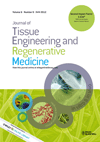
Journal of Tissue Engineering and Regenerative Medicine
metrics 2024
Bridging engineering and medicine for transformative health.
Introduction
Journal of Tissue Engineering and Regenerative Medicine, published by WILEY, stands as a pivotal platform in the fields of biomaterials, biomedical engineering, and regenerative medicine. With an ISSN of 1932-6254 and an E-ISSN of 1932-7005, this journal, based in the United Kingdom, has consistently delivered high-quality research since its inception in 2006, converging critical insights through 2024. With an impressive citation profile reflected in its Scopus rankings—specifically a rank of #58 in Medicine and #75 in Biomedical Engineering—the journal is acknowledged for its substantial impact, as demonstrated by its competitive quartile standings in 2023. Notably, it maintains a Q3 ranking in Biomaterials and Q2 in both Biomedical Engineering and Medicine (miscellaneous), showcasing its influence and relevance in the rapidly evolving interplay between engineering and medicine. The journal serves as a vital resource for researchers and practitioners aiming to stay abreast of innovations and breakthroughs in regenerative therapies, tissue scaffolds, and biomaterials. While not an open-access publication, it fosters academic dialogue and knowledge dissemination that is crucial for advancing the field.
Metrics 2024
 0.62
0.62 3.10
3.10 3.90
3.90 91
91Metrics History
Rank 2024
Scopus
IF (Web Of Science)
JCI (Web Of Science)
Quartile History
Similar Journals
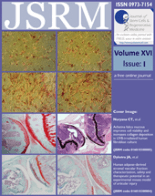
Journal of Stem Cells & Regenerative Medicine
Innovating Tomorrow's Regenerative SolutionsThe Journal of Stem Cells & Regenerative Medicine is a leading publication dedicated to the advancing field of stem cell research and regenerative medicine. Established in India and published by JOURNAL STEM CELLS & REGENERATIVE MEDICINE, this Open Access journal has been available since 2007, providing researchers and practitioners with free and unrestricted access to high-quality articles. With an ISSN of 0973-7154, the journal is indexed in Scopus, featuring a wide array of topics and insights into biochemistry, biotechnology, cell biology, and molecular biology, as denoted by its relevant quartile rankings. This journal is committed to bridging the gap between laboratory research and clinical applications, making significant contributions to the scientific community. The convergence of innovative studies from 2010 to 2024 positions it as an invaluable resource for those looking to stay at the forefront of stem cell and regenerative medicine research.

International Journal of Bioprinting
Empowering the bioprinting community with cutting-edge insights.The International Journal of Bioprinting, published by Accscience Publishing, is a pioneering platform dedicated to advancing the field of bioprinting and its applications in biotechnology and manufacturing engineering. Established in 2015, this journal has quickly gained recognition, reflected in its prestigious placements within the Q1 and Q2 quartiles across various categories, including Industrial and Manufacturing Engineering, Biotechnology, and Materials Science. With *Scopus rankings* placing it in the top percentiles of its respective fields, the journal aims to provide researchers, professionals, and students with cutting-edge insights and innovative methodologies that drive the evolution of bioprinting technologies. The International Journal of Bioprinting not only facilitates access to high-quality, peer-reviewed research articles but also supports the rapidly growing community dedicated to the exploration of bioprinting applications, making it an essential resource for those on the forefront of this exciting scientific frontier.

Tissue Engineering and Regenerative Medicine
Advancing the Frontiers of Healing and InnovationTissue Engineering and Regenerative Medicine, published by the Korean Tissue Engineering Regenerative Medicine Society, is a distinguished journal focusing on the interdisciplinary fields of tissue engineering, regenerative medicine, and related biomedical innovations. With an ISSN of 1738-2696 and an E-ISSN of 2212-5469, this journal disseminates cutting-edge research and advancements pivotal to developing therapeutic strategies that improve tissue function and repair. As a testament to its scholarly impact, it holds a Q2 ranking in both Biomedical Engineering and Medicine (miscellaneous) categories, reflecting its influence and relevance within the scientific community, particularly with a Scopus rank placing it in the 82nd percentile among similar journals. Although the journal does not offer open access, it provides vital insights and knowledge to researchers, professionals, and students involved in the quest for innovative solutions in medical science and engineering. With its convergence years extending from 2008 to 2024, the journal continues to be an essential platform for the dissemination of high-quality research that drives the field forward.

ARTIFICIAL ORGANS
Fostering Collaboration in the Realm of Biomedical Advances.ARTIFICIAL ORGANS is a leading academic journal published by Wiley, focusing on the interdisciplinary fields of bioengineering, biomaterials, and biomedical engineering. Established in 1977 and continuing through 2024, this journal plays a pivotal role in advancing research related to artificial organs and their impact on healthcare innovations. With an impressive impact factor and notable Q2 rankings across multiple categories, including Medicine and Biomedical Engineering, ARTIFICIAL ORGANS caters to a global audience of researchers, professionals, and students devoted to the latest developments in organ replacement and regenerative medicine. Although not an open-access journal, it maintains a rich repository of essential research articles, reviews, and case studies that collectively enhance the scientific community's understanding of artificial organ technologies. By publishing high-quality, peer-reviewed content, ARTIFICIAL ORGANS remains a vital source for emerging knowledge and collaborations in the exciting field of artificial organ research.

Materials Today Bio
Empowering researchers with open access to vital scientific advancements.Materials Today Bio, published by Elsevier, is an esteemed open-access journal dedicated to advancing the fields of bioengineering, biomaterials, and biomedical engineering. Since its inception in 2019, this journal has quickly made a name for itself, currently ranked Q1 in multiple categories including Bioengineering, Biomaterials, and Biotechnology, reflecting its exceptional quality and relevance in the rapidly evolving landscape of bio-related sciences. With an impressive Scopus ranking positioning it in the top 25% of its categories, Materials Today Bio provides a vital platform for researchers and professionals to share cutting-edge discoveries and innovative applications that bridge the gap between materials science and biological studies. Accessible to a global audience, this journal not only fosters collaboration among the scientific community but also aims to highlight significant advancements in cell and molecular biology, making it an indispensable resource for students and seasoned experts alike. The journal's commitment to open access since 2019 underscores its dedication to disseminating knowledge widely, ensuring that crucial findings reach those who can benefit from them the most.
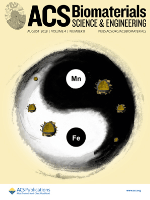
ACS Biomaterials Science & Engineering
Connecting Research and Application for a Healthier TomorrowACS Biomaterials Science & Engineering, published by the American Chemical Society, serves as a premier platform for the latest advancements and research in the fields of biomaterials and biomedical engineering. With an impressive impact factor and a strong reputation reflected in its ranking—Q2 in Biomaterials and Q1 in Biomedical Engineering—the journal attracts a diverse and engaged readership. Since its inception in 2015, it has aimed to foster innovation by publishing high-quality research articles, reviews, and perspectives on the synthesis, characterization, and application of biomaterials. Researchers and professionals benefit from the journal's rigorous peer-review process and its focus on translational science, making it essential for those looking to stay at the forefront of biomaterials research. Located in Washington, DC, USA, the journal plays a pivotal role in connecting academic and industrial sectors, ultimately driving advancements that impact biomedicine and related fields.
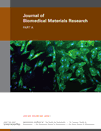
JOURNAL OF BIOMEDICAL MATERIALS RESEARCH PART A
Bridging science and healthcare through cutting-edge research.JOURNAL OF BIOMEDICAL MATERIALS RESEARCH PART A, published by WILEY, is a leading journal in the field of biomaterials and biomedical engineering, showcasing cutting-edge research that bridges the gap between material science and healthcare applications. With a robust 2023 impact factor reflecting its high-quality contributions, this journal is classified in the Q2 quartile for Biomaterials, Biomedical Engineering, and Ceramics and Composites, while achieving an impressive Q1 ranking in Metals and Alloys. The journal caters to a diverse readership, including researchers, professionals, and students, aiming to facilitate innovation and advancements in biocompatible materials and their applications in medical devices and tissue engineering. Access options for readers are available, ensuring the latest studies and findings are readily accessible to all stakeholders in this dynamic field. As it progresses towards its 2024 target, the JOURNAL OF BIOMEDICAL MATERIALS RESEARCH PART A continues to be an essential resource for anyone involved in the development and application of biomedical materials.

Stem Cells International
Unlocking the Potential of Regenerative MedicineStem Cells International is a premier open access journal published by HINDAWI LTD, focusing on the rapidly evolving field of stem cell research. With an ISSN of 1687-966X and E-ISSN 1687-9678, this journal has been a vital resource since its inception in 2010, showcasing innovative studies and breakthroughs up to 2024. Positioned in Q3 in Cell Biology and Q2 in Molecular Biology for 2023, as well as well-ranked in the Scopus database, the journal serves as an essential platform for researchers, professionals, and students dedicated to exploring the implications of stem cell technology in regenerative medicine and biological research. The open access model ensures wide accessibility, fostering collaboration and knowledge-sharing across the scientific community, making it a cornerstone in advancing the understanding and application of stem cell science.

Gels is a distinguished, peer-reviewed journal published by MDPI, focusing on the innovative field of gels and their myriad applications across disciplines such as bioengineering, biomaterials, and organic chemistry. Since its inception in 2015, this Open Access journal has provided a platform for researchers to disseminate cutting-edge findings, enabling wider visibility and impact for their work. Based in Switzerland, Gels has firmly established itself within the academic community, achieving notable recognition as evidenced by its recent Q1 ranking in Polymers and Plastics, and multiple Q2 placements in related categories, demonstrating its relevance and importance in the field. The journal serves as a vital resource for professionals and scholars aiming to engage with the rapidly evolving research landscape surrounding gel technologies, making significant contributions to sustainable materials, drug delivery systems, and much more. With its commitment to Open Access, Gels ensures that research findings are readily accessible to all stakeholders, fostering collaboration and advancement in science and engineering fields.
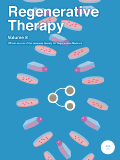
Regenerative Therapy
Pioneering research in regenerative therapy for a healthier tomorrow.Regenerative Therapy is a premier open-access journal dedicated to advancing the fields of biomaterials, biomedical engineering, and developmental biology. Published by Elsevier in Japan, this journal has been an influential platform since its inception in 2015, contributing significantly to the global discourse on regenerative medicine. With an impressive Q2 ranking in major categories such as Biomaterials and Biomedical Engineering, it is recognized for its quality of research and innovation. Researchers seeking to disseminate their findings or explore cutting-edge developments will find Regenerative Therapy to be invaluable, reflecting current trends and fostering collaborations across interdisciplinary boundaries. The journal offers open access, ensuring that high-quality research is available to a broad audience and enhances the impact of scholarly work in the regenerative medicine community.